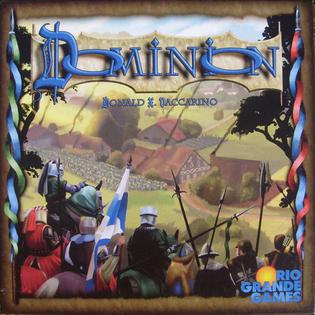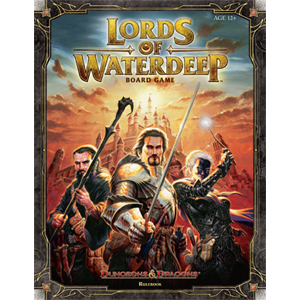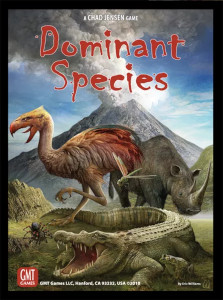
A Eurogame, also called a German-style board game, German game, or Euro-style game, is a class of tabletop games that generally has indirect player interaction and multiple ways to score points. Eurogames are sometimes contrasted with American-style board games, which generally involve more luck, conflict, and drama. They are usually less abstract than chess or Go, but more abstract than wargames. Likewise, they generally require more thought and planning than party games such as Pictionary or Trivial Pursuit.

Puerto Rico is a Euro-style board game designed by German designer Andreas Seyfarth and published in 2002 in a German-language edition by Alea. Players assume the roles of colonial governors on the island of Puerto Rico during the age of Caribbean ascendancy. Puerto Rico was the highest-rated game on the board game website BoardGameGeek for over five years, until it was surpassed by Agricola. The aim of the game is to amass victory points in two ways: by exporting goods and by constructing buildings.
In tabletop games and video games, game mechanics are the rules or ludemes that govern and guide the player's actions, as well as the game's response to them. A rule is an instruction on how to play, a ludeme is an element of play like the L-shaped move of the knight in chess. A game's mechanics thus effectively specify how the game will work for the people who play it.

Wallenstein is a medium-weight German-style board game designed by Dirk Henn and published by Queen Games in 2002. Though set during the Thirty Years' War, Wallenstein should not be confused with a complex wargame. Rather, it has the feel of a light strategy game with the familiar Euro elements of area control and resource management mixed in. As such, it has a wide range of appeal that attracts wargamers and non-wargamers alike.

Caylus is a strategy oriented, German-style board game designed by William Attia and independently published in 2005 by Ystari in France and England, and Rio Grande Games in North America. Caylus has a mix of building, producing, planning, and bargaining — without direct conflict or dice-rolling mechanics.

Shogun is a strategy board game designed by Dirk Henn and published by Queen Games in 2006. It is based on his earlier game Wallenstein, but it is set in the Sengoku period, which ends with the inception of the Tokugawa Shogunate.

Twilight Imperium is a strategy board game produced by Fantasy Flight Games in the genre of science fiction and space opera. It was designed by Christian T. Petersen and was first released in 1997. The game is in its fourth edition (2017), which has large changes over previous editions. It is known for the length of its gameplay, and its in-depth strategy.
Railways of the World is a railway-themed board game designed by Martin Wallace and Glenn Drover and published by Eagle Games. It is a simplified version of Wallace's earlier railway-themed game Age of Steam. The game, first released in 2005, was originally named Railroad Tycoon after the video game series of the same name, featuring box art based on the third entry in the video game series. After the license to use the Railroad Tycoon name expired, the board game has been published under its current Railways of the World title since 2009. It takes place in the eastern United States in 1830. Each player takes charge of a pioneering new railway company.

Imperial is a German-style board game designed by Mac Gerdts in which the object is to accumulate wealth in the form of bond holdings in successful countries and cash. Players take on the role of international financiers who purchase government bonds in the six pre-World War I empires of Austria-Hungary, France, Germany, Great Britain, Italy, and Russia. The principal bondholder of a nation gains control of its government and can order importation or production of armaments and ships; maneuvering of military units; construction of factories; and taxation. During play, an investor card is passed around which allows the purchase of additional bonds. A rondel – a wheel-shaped game mechanism with eight different options – is used to determine the options available to a country. The game box states that it is for 2–6 players, but a developer-supported variant allows play with seven. Imperial 2030 is a follow-up game released in 2009 with similar mechanics.

Agricola is a Euro-style board game created by Uwe Rosenberg. It is a worker placement game with a focus on resource management. In Agricola, players are farmers who sow, plow the fields, collect wood, build stables, buy animals, expand their farms and feed their families. After 14 rounds players calculate their score based on the size and prosperity of the household.

Dominion is a card game created by Donald X. Vaccarino and published by Rio Grande Games. Originally published in 2008, it was the first deck-building game, and inspired a genre of games building on its central mechanic. Each player begins with a small deck of cards, which they improve by purchasing cards from a common supply that varies from game to game. Cards can help the player's deck function, impede their opponents, or provide victory points. As of December 2022, fifteen expansions to the original Dominion have been released.

Race for the Galaxy (RftG), or simply Race, is a card game designed by Thomas Lehmann. It was released in 2007 by Rio Grande Games. Its theme is to build galactic civilizations via game cards that represent worlds or technical and social developments. It accommodates two to four players by default although expansions allow for up to six players, as well as solo play. The game uses iconography in place of language in some places, with complex powers also having a text description. While appreciated by experienced players for being concise, some new players find the icons difficult to learn and to decipher.

Lords of Waterdeep is a German-style board game designed by Peter Lee and Rodney Thompson and published by Wizards of the Coast in 2012. The game is set in Waterdeep, a fictional city in the Forgotten Realms campaign setting for the Dungeons & Dragons role-playing game. Players take the roles of the masked rulers of Waterdeep, deploying agents and hiring adventurers to complete quests and increase their influence over the city.

Terra Mystica is a Euro-style board game for two to five players designed by Helge Ostertag and Jens Drögemüller. The game was first published by Feuerland Spiele in Germany in 2012, and was later published in English and French by Zman Games and Filosofia Édition in 2013. Feuerland Spiele released a second German edition of the game in 2013.

Splendor is a multiplayer card-based board game, designed by Marc André and illustrated by Pascal Quidault. It was published in 2014 by Space Cowboys, Asmodee. Players are gem merchants of the Renaissance, developing gem mines, transportation, and shops to accumulate prestige points. Splendor received positive reviews and received numerous awards, including winner of Golden Geek Best Family Board Game, and nominated for the Spiel des Jahres Game of the Year in 2014. The game also received a mobile application and an expansion released in 2017.

Terraforming Mars is a board game for 1 to 5 players designed by Jacob Fryxelius and published by FryxGames in 2016, and thereafter by 12 others, including Stronghold Games. In Terraforming Mars, players take the role of corporations working together to terraform the planet Mars by raising the temperature, adding oxygen to the atmosphere, covering the planet's surface with water and creating plant and animal life. The game incorporates elements of resource management, engine building, and strategic planning. Players compete to earn the most victory points, which are measured by their contribution to terraforming and to human infrastructure. These goals are achieved by collecting income and resources which allow them to play various projects, represented by cards that increase their income or resources, build infrastructure, or directly contribute to terraforming the planet. The game was received positively by fans and critics, and received numerous awards.
Keyflower is a Euro-style board game designed by Sebastian Bleasdale and Richard Breese, and originally published by R&D games in 2012. It can be played by 2-6 players. In this game, players use their workers to try to build the best village among the players, by earning the most victory points in 4 rounds. The game features strategic use of workers, where players use them both for bidding for new village tiles and to use them. It has received numerous honors, and is ranked as the 50th best game in BoardGameGeek as of 2019.

Dominant Species is a 2010 competitive, area control board game published by GMT Games, designed by Chad Jensen. The game is an evolution-themed game in which players take on the role of broad categories of life: mammals, reptiles, birds, amphibians, arachnids, and insects in a world heading for the Ice Age.

Great Western Trail is a board game designed by Alexander Pfister for two to four players, which was published in 2017 by Eggertspiele. It is a complex and strategic 'Eurogame', loosely themed on the American frontier and the original Great Western Cattle Trail, in which players engage in the transportation of cattle. A second edition was published in 2021, for one to four players.
Ark Nova is a strategic board game for up to four people. It was designed by game designer Mathias Wigge, and first published in 2021. In Ark Nova, players aim to score conservation and appeal points by building a zoo. Upon its release, Ark Nova received positive reviews and received several awards.














